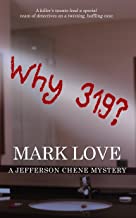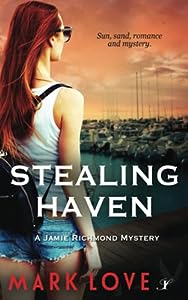Inside The Indie Author: A Conversation with Mark Love
- Diana Kathryn

- Apr 4
- 7 min read

Have you ever considered writing under a pseudonym, and why or why not?
My name already sounds like a pseudonym, especially for a guy who often puts a bit of romance in his stories, so I’ll stick with my real name.
What is your “go-to” method for working through or around writer’s block?
Reading over the scenes that I last wrote really helps kickstart the creative process for me. Often, I’ll stop writing in the middle of a scene or an exchange of dialogue. That makes it easier to pick up the thread for the story.
From your perspective, what are the most important elements of good writing?Knowing that the first draft is not perfect. It’s simply the practice of getting the rough story down. But everything from that point is subject to change. Character names, descriptions, locations, actions and interactions are all fair game for revision. I’m not a fan of redundancies. Repeated words or phrases will often get changed or cut during the review and revision process. There needs to be plenty of dialogue and it must be sharp.
What comes first – the location, the plot, or the characters – and why?
Characters rule. Every story revolves around them. I strive to make them believable, realistic in ways the readers can identify with. Once the main character is established, everything flows from there.
What are your least favorite and most favorite things about publishing a book?Least favorite is promotion. It takes a lot of time and energy to find effective methods to connect with potential readers. But it is necessary. You can have the greatest book ever written, but if no one has ever heard of you or the story, you may never sell a copy.
One of my favorite things is meeting people at festivals and persuading them to buy one of my stories. The excitement in their eyes, the eagerness to learn more about my characters, confirms that I’m a good storyteller.
What is a significant way your book changed from the first to the final draft?
Final drafts are polished. Every aspect should be crisp. Descriptions, narration, dialogue, conflicts, resolutions all need to be addressed. There should be no loose ends. No gaps in the story that would leave a reader wondering what happened. Readers should have a sense of satisfaction when the story ends. And hopefully, it makes them want to pick up another one of my books.
What was the inspiration for your most recent book?
I worked in many industries over the years and occasionally witnessed an executive or manager that would take credit for their employees’ efforts. Some of these people were egotistic, claiming to be the sole source of intelligence for their department or team. I started wondering about the possibility of pushing the wrong person too far. That led me to write “Part-Time Criminal”.
Where are your most productive writing spaces, and what elements are important about that space to keep you focused on writing.
My desk is in a secluded area in the house, so I don’t get distracted by what’s going on outside. There must be music. It’s essential to life. I cannot work in silence. The genres may change from classical to classic rock, blues or jazz, but there must be music. If I’m on the road, I may work out ideas for scenes or dialogue, then jot them down or enter them into the computer when time permits. I don’t drink coffee, so there’s water handy.
If you were to give one of your side characters a novella of their own, who would it be, and why do you think they need their own story?
That’s like trying to pick your favorite child! One possibility would be Ian, the teenager who appears in several of the Jamie Richmond mysteries. It’s possible this could be a young adult novella, with a touch of mystery and bit of that teen romance with Brittany, the girl he’s dating who also appears in two of the books. Should I attempt that, I have no doubt a certain redheaded female will make a cameo appearance.
What risks have you taken with your writing that made the book better?
I don’t know everything. Never claimed to. It’s my practice when working on a story to do a lot of research to keep the details accurate. And I’m always looking for expert advice from someone I meet. I’m not shy about contacting them later for an interview, where that information can help with the story.
What’s the best monetary investment you’ve ever made with regard to your writing practice?
I took two creative writing courses while in college. That was great for the fundamentals. Technology keeps improving, so I’ve bought several computers over the years. I have a copy of On Writing by Stephen King and the Writer’s Digest Character-Naming Sourcebook right next to my desk. They both get a lot of use.
When you first began writing, what was a common procrastination trap you encountered, and how did you overcome it?
I doubted whether the stories were any good, if anyone would ever be interested in reading them, let alone buying them. It took some practice to get to the point where it became the type of story I liked to read. Perseverance is essential for a writer. I grew to take the approach ‘just write, baby’. There will be time later to make it better.
What is your writing software of choice, and what is its best feature?
Microsoft Word has always worked well for me. I used it in business for many years, so it’s something I’m familiar with. Easy to move sections around with the cut and paste feature, which is essential for my style of writing.
Do characters’ names come immediately to you?
Some do. In the past, I would take names from the obituaries. A combination of names often worked. Occasionally I’ll use the name of a good friend for a character. Do you add them in a final draft? I’ll make a dramatic change with a name before the final draft. Usually by the second or third round of edits, I’ve got all the names down. Where do you find names, and how do you make a final decision about the names you’ll use? The Character-Naming Sourcebook helps. I like the names to have a specific meaning, something that may give a clue as to how the character may behave. I also like using different ethnicities for my characters. I don’t want readers to get confused over bland names like Brown, Gray, Jones and Smith.
Tell us the title of one of your favorite novels, and why this book is a favorite.
Why 319? has always been a popular book. This was my first attempt at writing a police procedural story. I took some elements from my experience as a freelance reporter and used them to create a cast of detectives that would be memorable. There are many twists and turns in the book, which keeps the readers engaged.
Think of the title of a hugely popular novel. What is one major thing you would change about the book?
Southern Man by Greg Iles. I’ve enjoyed several of his earlier books. This one could have easily been 100 pages shorter, as some of the key elements kept getting repeated. There were also some glaring mistakes that should have been caught in the editing process.
What are you reading right now?
False Impression by Jeffrey Archer.
If you could take on the identity of a character in one of your favorite books for twenty-four hours and retain the memory of that experience, which character would you choose? Tell us the title, author, character name, and why you would want to be that character.
Ocean Prey by John Sandford. I’ll take the Lucas Davenport character. Lucas is unusual. He worked his way up through the ranks of law enforcement in Minnesota, becoming a deputy chief for the Bureau of Criminal Apprehension. He also made a fortune developing role playing board games that transitioned to become computerized training modules for first responders. Lucas Davenport is also a dedicated family man who has a loyal group of friends and colleagues. Davenport is now a Deputy U.S. Marshal who gets assigned to complicated, unusual cases. In this book, he’s brought in when three Coast Guardsmen are murdered during a routine stop in Florida.
Davenport is tough and determined. He has the innate ability to develop unique strategies and unravel strange clues that help him identify and catch the criminals. The chance to inhabit his brain for a day would be priceless.
If you could save five books from being destroyed in the apocalypse, what books would you choose, and why?
11/22/63 by Stephen King.
Map of Bones by James Rollins.
Ocean Prey by John Sandford.
The Lonely Silver Rain by John D. MacDonald.
Get Shorty by Elmore Leonard.
I’m a fan of mysteries and crime. These are great examples from some of the best storytellers in the modern age. King’s tale looks at that historic date and throws you a curve with the ‘what if’ scenario. It’s massive (of course) but that hasn’t stopped me from reading it several times now.
Tell us a little something about your current WIP. When do you expect it to be released?
Agonasti’s Dilemma is my latest project. Leo Agonasti first appears in “Your Turn to Die” which is the second Jefferson Chene mystery. Leo is a retired mobster who has a tenuous relationship with Chene. After receiving many great comments about the character, I decided to give him his own story. This one is set back in 1992, when Leo is still actively working for organized crime. It’s my hope that the story will be finished soon and I’ll be able to find a home for it with a publication date in 2026.
What are the titles and genres of each book you’ve written?
The Jamie Richmond mysteries include:
Devious,
Vanishing Act,
Fleeing Beauty
Stealing Haven and
Chasing Favors.
The Jefferson Chene police procedural mysteries include:
“Why 319?”
“Your Turn to Die” and
“The Wayward Path”.
“Rules of Desperation is a standalone thriller.
“Part-Time Criminal” is a mystery/crime novella.
How can readers find you? Website, social media, amazon author page… share all the links!
























Comments